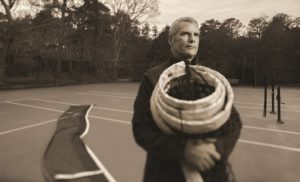STEVE OLIVER / TENNIS CLUB OWNER / WELLFLEET

As youngsters, Steve Oliver and his siblings spent summers sweeping the red clay courts on Route 6 in Wellfleet. It was a family business, and the Oliver kids were recruited whenever someone needed another player. Maintaining red clay courts may be a dying art, but more than 50 years later, Steve is still tending the clay, making sure the courts not only look good but play just right. Here’s Steve in his own words.
Red clay tennis courts, yeah, it is sort of unfortunate — they are dying out. Working on red clay courts is like working on a garden. It’s like working with something alive. You water them, you weed them, you take care of them. You look after them. Just like a garden, you’ve got to walk around and pay attention.
You have to have a certain personality for it, I would say. It’s not for everybody. You have to have a will, a determination, for sure. You have to be sort of steadfast. You need that kind of devotion. You just can’t go through the motions with it, that’s for sure.
Now, it’s hard work, but I actually get — I don’t know — it’s like a Zen feeling out of it. I’m not really that kind of a person, but I — what am I trying to say? There’s definitely a satisfaction out of it.
I guess this sounds strange. I actually find it kind of relaxing. I’m not trying to set a record. You know, I’ve done that in the past, where I was out to see how fast I could go. I’m not worried about that anymore.
This is really my father’s baby. It’s my father’s legacy. My father was a phys ed teacher up at what was called Lowell Technological Institute. He had his summers off and wanted to make money in the summertime to supplement his income. That’s why he had the cottages down here. We had the jelly stand. And then, he came up with the idea of tennis, and it was actually brilliant.
So, it would have been in the late ’60s. He suddenly just throws out that we’re going to build a couple of tennis courts. I had no idea that my father owned a tennis racket, that he played tennis. And, in fact — this is going to sound a little harsh — but back in those days, my brothers and I, we didn’t consider tennis a sport. Basketball, baseball, football, you know, those were sports. Tennis, that was kind of for the rich kids. I know that’s kind of an ugly thing to say, I guess, but that’s just the way it was. My father learned about working on tennis courts, basically, by just doing it. He got very good at it.
You know, like anything else, it started off a little slow the first summer, but the second summer it started taking off, and he hit the tennis craze absolutely perfectly, because in the ’70s and the ’80s, tennis just went ballistic.
I grew up with this place since I was 12, and I’m now 64. So, when I took over, I would have been in my late 30s. I really wanted the business to be viable for 50 years. We just hit that. Fifty years would have been in 2019. When I took over in 2002, it was just like, I got to get to 2019, got to get to that 50. I want the 50 years! That was surprisingly a huge motivating factor. And now, of course, I’ve reached it. It’s kind of funny, because I had all this big buildup to it. And when it finally came around, it wasn’t like anything was different. It was like any other year.
But 50 years for a small-time family business — I think that’s pretty good.
In the summertime, I usually get here about seven. It’s nice. You know, the sun is up first thing in the morning. There’s a freshness usually to the air. I go to about noontime. I spend a good hour and 45 minutes. It just depends how many courts have been used and how banged up they are. I’ve got to put them back together again, sweep them. And then, you know, sometimes I have to water them. Then I take a quick break, and then I’m back again at three o’clock.
By six o’clock, I’m sort of wrapping things up again. I have to fix the courts up, sweep them up, do the footwork, water them, get them ready for the next day.
So, at the end of this year, we’re gonna lose four of the red clay courts. They’re the ones that are closest to the highway. My oldest brother is planning to build a spec house on courts three and four. You know, I’ve wrapped my head around the change, and I’m good with it, because I know it’s really going to help me. It’s gonna make things a lot more manageable, a lot more enjoyable. I think what it’s going to do is keep me in business much longer.
I would love to get to the point where I can actually hit the ball a little bit more often than I do now. I very rarely get out there, because usually I’m too beat up. My knees are sore, my back, or whatever. I’m not going to be able to keep eight courts going into my 70s. That’s just not a reality. Having four courts versus eight courts — okay, it really is going to fit.
